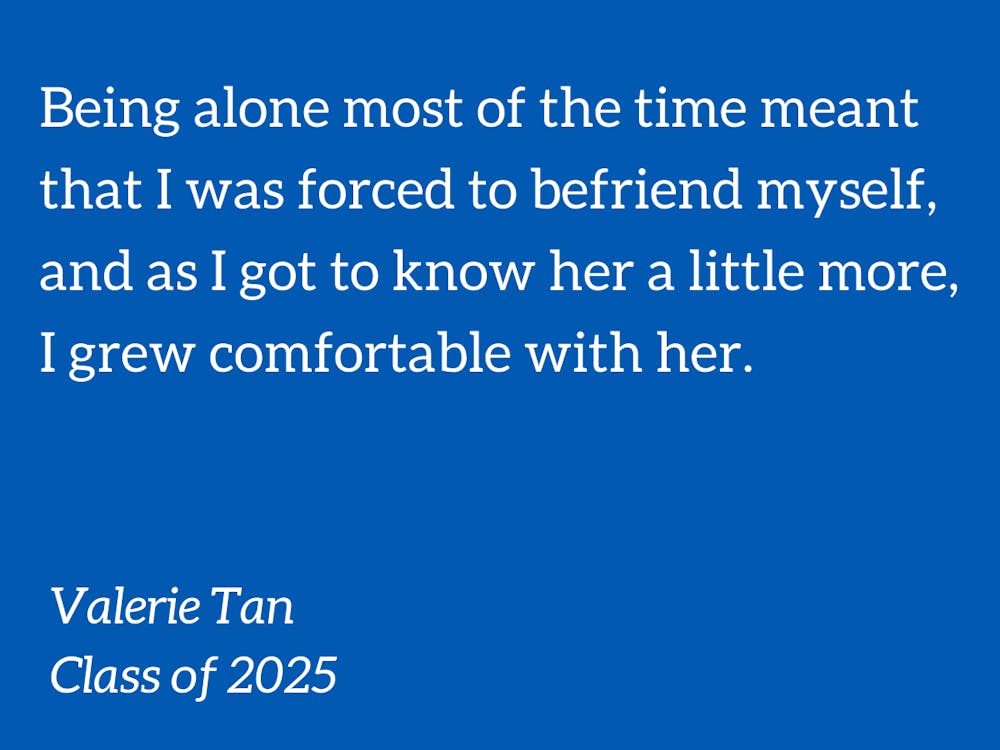I used to be enslaved by people’s opinions of me.
I lived in a prison of the expectations of my family, friends, teachers, even strangers, giving them the power to govern my thoughts and feelings. A puppet on strings, I surrendered agency over a lot of important decisions. Pleasing others mattered more than doing as I pleased. My self-worth, so heavily contingent on their affirmation and admiration, always teetered precariously on the brink of collapse, threatening to plummet whenever I fell short of my reputation as a high achiever. I tried to extricate myself from the shackles of this wretched reputation, only to perpetuate it year after year because I was addicted to external validation—I needed it.
Taking a leap into Duke was probably the first time I mustered the courage to reclaim control over my life. I had rejected the gilded paths guaranteed by prestigious government scholarships in exchange for the freedom to explore my interests without any strings attached. Objections were raised and feathers were ruffled. But after all these years of allowing other people to stake their claims to my life, I was finally ready to start living for myself.
As intimidating as it was to travel halfway across the world by myself, the American college experience held the allure of a fresh start. Going to school on a new continent meant that I was a blank slate, no longer overshadowed by preconceived notions or prescribed expectations. In an environment where everyone was equally competitive and competent, I was no longer the “smart kid” in the room. There were so many new roles I could choose to assume, and how I redefined my identity was entirely up to me.
The thing is, when you spend most of your life obsessing over what other people think of you, you don’t just suddenly stop caring overnight. College might have granted me liberation from my academic reputation, but it certainly sent my hardwired people-pleasing tendencies into overdrive on the social front.
My college friends would probably be taken aback by this revelation, given that I pulled no punches in asserting my aversion to people. As I often told them in jest, I would much rather bask in the solitude of my room than mingle with the rest.
But this playful sarcasm was really just a facade masking a lurking insecurity.
Whenever I was in the presence of others, the compelling urge to make myself “likable” became a driving force underlying my interactions with them. I coped with this insecurity by overcompensating. I started to observe their body language and facial expressions closely, analyzing their reactions and adjusting my behavior accordingly to cater to their preferences. I apologized more often than I should have, allowing my boundaries to be transgressed and my pride to be trampled upon, all in the interest of preserving the goodwill between us.
Making new friends was especially unnerving. I dreaded the initial period of trial and error, of figuring them out and learning how to form emotional connections with them. But close friends were an even greater source of stress. My family away from home, they had become so inextricably intertwined with my life that I relied heavily on them for emotional support and derived my sense of self largely from my relationships with them. I often put them before myself, making sure to be lavish with the time and affection I gave them, as though I constantly needed to prove myself worthy of their friendship.
At some point, I got tired of giving so much of myself away. I had escaped from one prison only to be ensnared within another and was once again at the mercy of the vagaries of other people’s emotions and actions. The social stress was taking a toll on my mental health. Friendships were straining under the weight of the subconscious expectation of reciprocity and the disappointment it inevitably bred.
The solitude that accompanied two weeks of remote learning at the start of the semester turned out to be the perfect environment for me to wean myself off dependence on external validation. Ensconced in my little bubble of isolation, I could focus on myself for once. I immersed myself in classes because I genuinely enjoyed the intellectual stimulation. When I felt suffocated in the confines of my room, I embarked on spontaneous solo walks for a breath of fresh air. Being alone most of the time meant that I was forced to befriend myself, and as I got to know her a little more, I grew comfortable with her. I gained clarity on her likes and dislikes and formed a better understanding of where her personal boundaries lay. A sense of self that truly derived from within started to take shape and so did the mental strength I needed to regulate my own thoughts and emotions.
By the time everyone returned to campus, I had grown so content with being by myself that their opinions no longer carried the same weight as before. I no longer lost sleep over whether I had accidentally upset someone so long as my conscience was clear. I no longer tried hard to appease everyone in the room. Once I stopped worrying so much about what other people thought and simply focused on being the best version of myself, my insecurities disappeared.
The overthinker and people-pleaser in me still rear their ugly heads from time to time, for the art of self-awareness and equanimity is not an easy one to master. But I have faith that I will get there one day.
Valerie Tan is a Pratt first-year. Her column runs on alternate Fridays.
Get The Chronicle straight to your inbox
Signup for our weekly newsletter. Cancel at any time.
Valerie Tan is a Pratt junior and an opinion managing editor of The Chronicle's 119th volume.

